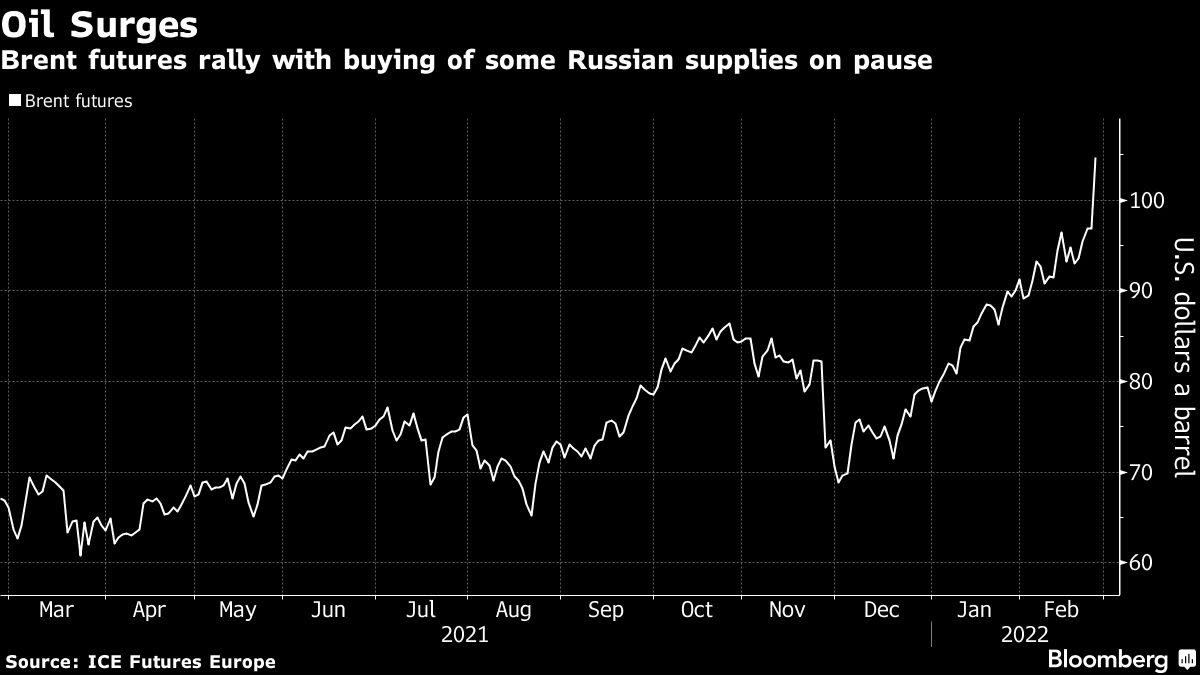Russian Oil Offered at Record Discount as Buyers Hit Pause

(Bloomberg) — Russia’s flagship crude oil was offered for sale at a record discount as some buyers and shipping companies fretted over potential sanctions by the West following the country’s invasion of Ukraine. Oil freight transportation costs boomed.
Most Read from Bloomberg
The nation’s Urals crude was offered at $11.60 a barrel below Dated Brent, a marker for physical oil transactions in Europe and beyond. That’s the deepest discount in at least 11 years of data compiled by Bloomberg. There were no bids. Separately, a large tender for the grade also went unsold.
Russia’s invasion of Ukraine has made the market leery of a sanctions backlash. Officials at three large oil tanker companies, two shipbrokers, four oil traders, and one refinery all said that Russia-related activity has been put on hold for now. The country sends about two-thirds of its exports by sea to end-users, with many of those cargoes handled by traders.
The West is threatening further punishing sanctions after Russian forces attacked targets across Ukraine and President Vladimir Putin vowed to “demilitarize” the country and replace its leaders, triggering the worst security crisis in Europe since World War II.
“Buyers in Europe will probably avoid taking Russian crude as long as the tensions remain elevated even if U.S. does not impose full scale sanctions,” said Alex Kavouris, lead oil analyst at Facts Global Energy.
Crude Rush
The offer to sell Urals at $11.60 a barrel below Dated Brent on a pricing window organized by S&P Global Platts was for supplies delivered to Rotterdam and is bigger than any other such discount in at least 11 years. Platts also said it wouldn’t publish bids, offers, trades and market values for oil loading in the Black Sea.
Freight rates from Russia’s Baltic Sea soared, according to the Baltic Exchange in London. The daily earnings for a tanker moving a 100,000 ton cargo of Urals crude from the region into Europe jumped by almost 800%, reaching $121,741 and underscoring the reticence among some owners about taking Russian cargoes.
The situation has prompted a rush for crude from other parts of the world, according to Lars Barstad, the chief executive officer of the management unit of Frontline Ltd., one of the world’s largest owners of supertankers.
“Buyers are looking to source crude from safe suppliers,” he said, adding that the markets for supertankers are “already reacting.”
Traders are looking for barrels from suppliers including the Middle East, West Africa, the Middle East and Brazil, and rates for chartering the giant supertankers are climbing as a result, according to Barstad.
In the U.S., traders at a large refiner and an oil-product blender have been advised by their companies not to purchase any Russian oil to avoid potential delivery snarls in the event of further sanctions by the Biden administration, according to people familiar with the matter. Another oil-trading company has been told by its management to only purchase Russian oil cargoes that are sold on a delivered basis where cancellation of the transaction would be permitted, a separate person said.
Big Impact
A loss of Russian crude — if it were to happen — would come at a terrible time for the global oil market, where inventories have slumped and demand is surpassing supply.
Russia shipped about 3 million barrels a day of crude by sea each day in December, according to data compiled by Bloomberg. That constituted roughly two-thirds of its total exports.
“The conflict will result in a significant shift in trade flows, at least temporarily, with less risk-averse Asian buyers stepping in to buy Urals and Russian products,” said Livia Gallarati, an analyst at Energy Aspects Ltd. “Which means Urals and products differentials have to correct lower to clear east.”
This should see European buyers willing to pay higher prices for the North Sea grades Forties and Johan Sverdrup, while those with Middle Eastern term deals should nominate full volumes for April, she said.
Brent rose above $105 a barrel on Thursday, gaining as much as 9.2% at one stage.
Companies that are due to carry out contracts in the Black Sea will now find themselves in the difficult position of deciding whether to perform or to turn back, each with costly consequences, said Andrew Brooker, managing director at marine insurance broker Latitude Brokers.
Insurers would decline to cover a trip that could soon breach sanctions. On the other hand, not fulfilling contracts also runs the risk of litigation, he said.
(Updates with shipping costs in 1st and 7th paragraphs.)
Most Read from Bloomberg Businessweek
©2022 Bloomberg L.P.




